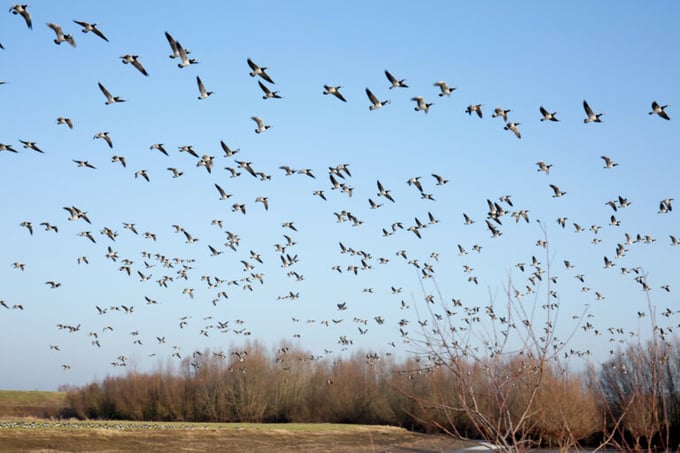May 20, 2025 | 00:03 GMT +7
May 20, 2025 | 00:03 GMT +7
Hotline: 0913.378.918
May 20, 2025 | 00:03 GMT +7
Hotline: 0913.378.918

Migratory birds are largely responsible for the spread of avian influenza. Photo: Herbert Wiggerman
The reduced number of cases in European countries could also be linked to immunity in some wild bird species, depletion of some wild bird populations and changing composition of circulating highly-pathogenic avian influenza virus genotypes.
However, as autumn migration approaches, France is ramping up its vaccine programme, purchasing another 67.75 million doses. In addition, a team of virologists with the UK’s Animal and Plant Health Agency and others have found the global spread of the H5N1 avian influenza virus has made its way to multiple bird species in Antarctica, some of which migrate to other parts of the world throughout the year.
Protection during migration
Companies that normally allow hens access to the outdoors, such as Kipster, keep them inside during migration periods. The company notes that “outdoor access and biosecurity are often at odds with each other,” but, “even during confinement for diseases such as highly pathogenic avian influenza, stimulating, spacious indoor gardens provide a safe environment and ensure chickens’ well-being is not compromised by restrictions.”
In addition, the company notes the use of protective clothing, sanitation practices, and other preventative measures to minimise exposure of the hens to avian influenza and mitigate the risk of transmission from the outside world.
The company also reports that this spring in the US, when the risk was heightened due to several avian influenza outbreaks on poultry and dairy farms in Indiana and neighboring states, the Kipster visitor centre closed for a few months. It was open as of early September, but visitors are asked not to enter the farm property, including the visitor centre, if they have been in contact with birds 72 hours before visiting.
Antarctica outbreaks
UK-based scientists on the Antarctic highly pathogenic avian influenza research team note that avian influenza has spread globally in recent years, first in the Eurasia during 2020-2021 before transatlantic spread to North America and onward dissemination into South America.
“This worldwide progression has been driven by migratory wild bird species with avian and mammalian mass die-offs reported as far south as Patagonia,” they explain. “By autumn 2023, it was evident that this spread would not stop at the Americas: field evidence suggested that an intercontinental jump to Antarctica was imminent.”
They have detected H5N1 highly pathogenic avian influenza virus in samples in Antarctica from brown skuas, southern fulmars, black-browed albatrosses, Kelp gulls, Antarctic tern, South Georgia shag, Southern elephant seals and Antarctic Fur Seals.
(Poultryworld)

(VAN) Fourth most important food crop in peril as Latin America and Caribbean suffer from slow-onset climate disaster.

(VAN) Shifting market dynamics and the noise around new legislation has propelled Trouw Nutrition’s research around early life nutrition in poultry. Today, it continues to be a key area of research.

(VAN) India is concerned about its food security and the livelihoods of its farmers if more US food imports are allowed.

(VAN) FAO's Director-General emphasises the need to work together to transform agrifood systems.

(VAN) Europe is facing its worst outbreak of foot-and-mouth since the start of the century.

(VAN) The central authorities, in early April, released a 10-year plan for rural vitalization.

(VAN) Viterra marked a significant milestone in its carbon measurement program in Argentina, called Ígaris, reaching 1 million soybean hectares measured.